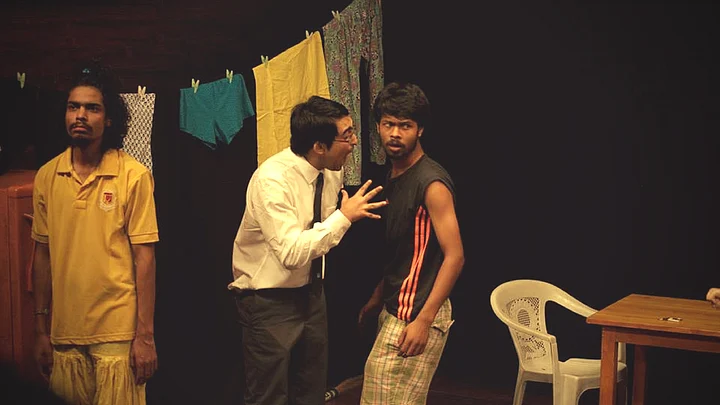Last year, I went for a play. It was a play by the Delhi based Third Space Collective – a group of theatre practitioners amalgamating movement, text, music and multimedia with theatre.
The play was called Dastaan-e-Bhookh, a dark comedy about a family fighting hunger, constantly fighting to stay afloat and in the process becoming the targets of an indifferent and predatory society. It got me thinking about people around me. How many of these people do we come across each day and how many of their stories do we pay attention to? Are we even interested in listening to the voices in the margins or are we too content with our lives to look deeper into what plagues the urban jungle that we live in?
I found some answers close to where I live. Outside my apartment in east Delhi, cycle rickshaw wallahs sit in a line, waiting expectantly for their customers to come out.
Three Rotis and Sugar Laden Tea
One evening, as I stepped out of the apartment, there was only one rickshaw puller at the makeshift stand. He was sitting on a parapet beside the rickshaw and was about to eat. On his plate were three rotis and a cup of tea from a nearby shack. That was his dinner.
He and most others were from Bihar, from a region just 50 kilometres away from Patna. Being a Bihari, I thought it was my right to ‘know’ them. Many rides and multiple superficial conversations later, I realised I knew nothing about them.
I didn’t know how one could survive on three rotis and sugar laden tea and still do physical work all day. I didn’t know how they could possibly live on barely 6,000 rupees a day and still save enough to send back money to their family. I didn’t even know their names. I doubt I even wanted to. They were, after all, just providing a service and I was merely a customer. My humanity was lost in my lack of interest in their humanity.
Delhi, Noida, Gurgaon and cities all around India are full of these nameless, faceless people you see every day. They live in shelters and rooms with no roofs. They work to build our homes, they work to protect them as guards, they work to keep them clean, they feed us everyday, they ferry us across town. They are nameless, without an Aadhar which forbids them access to any welfare benefits that the government has to offer. They are the cheap labour who lay the foundations of our comfort and dreams. They are people who are invisible, hungry and barely surviving.
We, on the other hand, are too busy to even notice them. It becomes difficult to grasp the meaning of hunger, of people living in the margins, of poverty and the struggle for life when your live a life full of privileges. You might argue that you work hard for it but so do they, perhaps harder than you do.
The inequities of society that we have built in our cities is stark. We choose to turn our eyes away from it whenever it presents itself to us. And it does that everyday. In the slums beside our localities, in villages hidden behind grand apartments of Noida and Gurgaon, on pavements where countless men, women and children sleep everyday.
It comes as no surprise then that a majority of our privileged classes are indifferent to the struggles of millions of individuals who fight everyday for survival. In this era of consumerism we can choose not to read or hear about them.
In this mad rush for ‘progress’ we don’t care if there are people getting rolled down by our dreams and aspirations.
Dastaan-e-Bhookh and Conversations
In this context, it becomes important for art to bridge the gap. This year, Third Space Collective is reviving Dastaan-e-Bhookh and along with that, they are also organising a number of addas/conversations around home, land, ownership and belonging. These are important and urgent questions which demand our attention. In a society that is fragmented and a population that is alienated, it’s high time that we created space for conversations which highlight the importance of compassion and of paying close attention to the humanity within us.
We have a long way to go if we want to fight inequalities and build a compassionate society that is the need of the hour. Art and conversations are a step in the right direction.
(For more information on their work or the upcoming events visit the Facebook page of Third Space Collective here.
(Abhishek Anicca is a Delhi based writer, poet and spoken word performer who writes and talks about politics, culture, gender and films. When not writing, he works in the development sector as a consultant on public health and education. He tweets @gumnaam_musafir)
